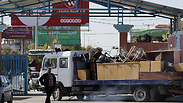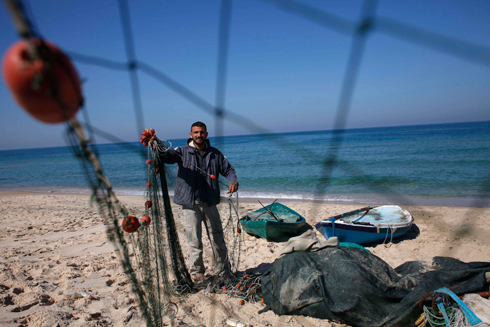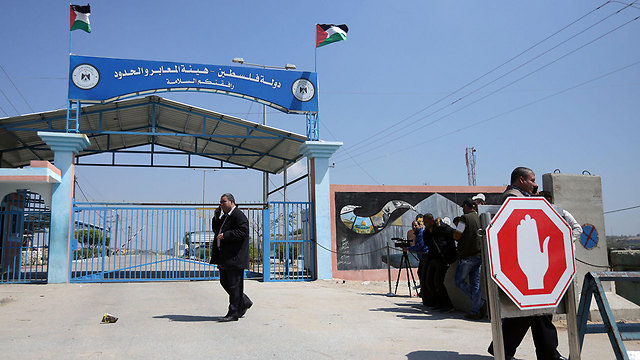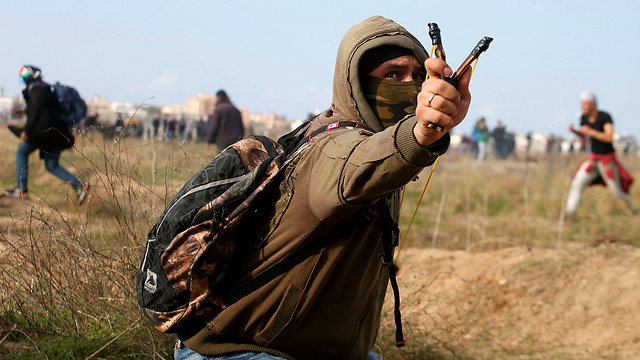
File photo. The Erez Border Crossing
צילום: AFP
Despite tensions, Israel approves Gaza humanitarian relief measures
IDF decides on series of relief measures for beleaguered Gaza populace, including more entry permits for traders, young people, more lenient terms for fishermen; COGAT, Southern Command officers conferred on measures, agreed to move forward despite official Israeli position on no humanitarian crisis.
Israel has decided on a series of humanitarian measures to improve living conditions in Gaza, despite recently building tensions on the Gaza border in the wake of explosive charge detonations, tunnel destructions and Hamas promising to hold mass protests near the fence in the coming months.
The IDF has recently decided on the following steps to improve humanitarian conditions in the isolated enclave: traders from the strip will be allowed to enter Israel to participate in business dealings, the amount of fruit and vegetables allowed to be exported from Gaza was increased, entrance permits to younger Palestinians were granted and increased truck traffic was allowed to enter Gaza through the Kerem Shalom crossing.
In addition, a series of reprieves for the fishery sector were agreed upon, as part of which Gaza fishermen will be allowed to go out to sea for longer periods of time.
The aforementioned decisions were reached in coordination between the office of the Coordinator of Government Activities in the Territories and Southern Command officers, in accordance with daily status evaluations of the humanitarian situation in Gaza.
While Israel is of the official opinion that there is no humanitarian crisis in Gaza, officials have nevertheless deemed the situation "extremely severe."
One of the laborers leaving Gaza to work in Israel Tuesday recounted, "In the past three months I couldn't get in. I came to the Erez crossing every day to see if the permits had come in, and they kept turning me away.
"Several days ago I finally received the permit. I really hope there won't be a change. We only want to live in Gaza, bring food home, education for the children. We're not looking for wars, but I unfortunately know the situation will revert back.
"I only hope that until it does we can get as many goods in and out as we can. A lot of people need it. The situation pains me, I wish it was over."
The decision to attempt to ameliorate Gazans' lot was indeed reached during a period of slow, gradual military escalation near the border fence. This past weekend, the IDF destroyed an Operation Protective Edge-era terror tunnel leading from Rafah to the Eshkol Regional Council, which Hamas tried to use.
It was neutralized underneath Israeli territory by pour large quantities of substances preventing it from being used. An additional tunnel was destroyed at the same time after being hit by an air force attack in the central strip.
A device placed in the northern side of the Gaza border detonated Saturday, in the same region two other charges detonated two days prior. It was the fifth such incident in the last three months.
The security incidents took place on the backdrop of a civil campaign gaining steam recently with Hamas's blessing, titled "The great return march"—the culmination of which will include mass marches from Gaza to the border to commemorate Palestinian refugees' right to return to their land, as the Palestinians perceive it.
The marches are set to take place twice: on Land Day on March 30 and on Nakba Day on May 15.
Situation in the strip is not tense only due to relations with Israel, however, but also due to intra-Palestinian splits and the seeming demise of the Hamas-Fatah reconciliation agreement.
Palestinian Authority President Mahmoud Abbas, who has yet to remove sanctions levied on the strip's populace, declared Monday more sanctions will be added in the wake of Hamas's alleged complicity in the attempt on the life of Palestinian Prime Minister Rami Hamdallah.













